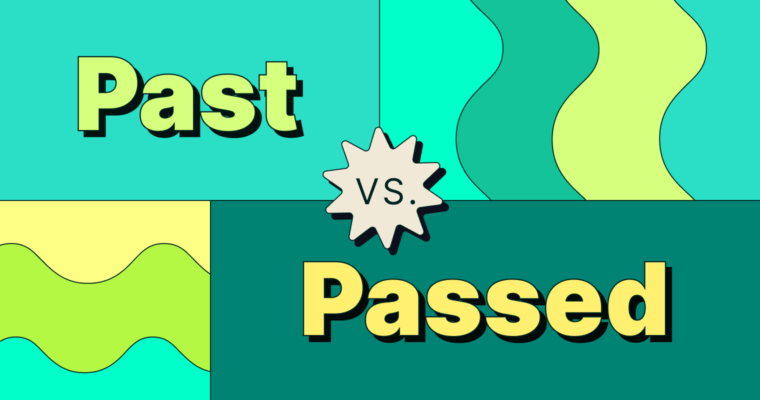
Remember the feeling of taking your driving test? Your palms were sweaty and your posture rigidly straight as you tried your hardest to make smooth turns and stops.
With your shiny new license in hand, it was high time to celebrate! As you excitedly texted all your friends, suddenly you were confused—“I past!” simply didn’t look right. Is the proper phrase actually “I passed”?
These types of grammar questions come up all the time and usually relate to words that look similar to each other but have different meanings. Known as homonyms, past and passed are two words spelled similarly and pronounced nearly identically, just like there and their.
We’re here to help you get past the confusion. Let’s explore the difference between past and passed so you never mix up these sneaky homonyms again.
What do past and passed mean?
Past refers to time or events that have already happened, while passed is the past tense of the verb pass and is used to indicate completed actions or events. For example, “She finally passed the driving test, leaving all her doubts in the past.”
Knowing the definitions of past and passed is the first step to recognizing their differences.
The definition of past
Past can function as several different parts of speech, each with different meanings, though the most common usage of past is as a noun to indicate an earlier time or era. It can also function as an adjective, adverb, or preposition and mean the following things:
Noun: Past means “an earlier period of time.”
Houses were more affordable in the past.
Adjective: Past can also be used to describe a noun. In this form, past also means “gone by in time.”
In past summers, we’d go to the beach in Delaware.
Adverb: The word past is also a common adverb used to describe a verb or adjective and can indicate passing from one side of something to the other.
Ari worked past her issues with Gina.
As a preposition: Lastly, past as a preposition is typically used to tell time or to refer to being beyond a particular point or stage.
It is half past five o’clock.
The milk was past its expiration date.
The definition of passed
Passed is the past tense and past participle of the word pass. Because of this, passed functions only as a verb. Nonetheless, the word pass has many different meanings; here are some of the main ones you’ll encounter:
- To move or proceed
- To be transferred
- To throw or kick (a ball)
- To go away
- To die (with religious connotations)
- To give up control
- To decline to speak or bid
- To be confirmed as a law or rule
- To go from one state of being to another
The one quality that unites all of these different meanings of passed is they are each indicative of an action or event that has already happened. The addition of the -ed suffix to the verb pass makes it past tense, signaling a preceding era.
Past vs. passed
With commonly confused words, it’s useful to commit a distinguishing trick to memory. In the case of past and passed, all you have to do is remember that passed is always a verb.
While both words have many meanings that have to do with motion and time, past is never a verb. As long as you identify whether or not the word is a verb, you will know which usage is correct.
Past vs. passed examples
Need a few more examples of past and passed being used correctly? Here are some additional sentences that get it right:
Examples with past:
- She liked to reminisce about the past and recall happier times.
- They couldn’t move past the car that was blocking the road.
- Ada’s past year of voracious reading has turned her into a real expert on film history.
- I think we’re past the point of no return.
Examples with passed:
- My grandmother passed away in January.
- The filly passed us at a trot, leaving a trail of dust in her wake.
- He passed the baton to his young and talented predecessor.
- Excitement passed through the crowd with mere minutes remaining in the match.
Past vs. passed FAQs
What does past mean?
The term past has subtly different meanings depending on how it’s used in a sentence, but generally it refers to a time or era that has already occurred prior to the current moment.
What does passed mean?
The meaning of passed depends on the context in which it is used. Some common interpretations include “to move or proceed,” “to die,” “to go away,” or “to be transferred.”
What’s the difference between past and passed?
Past refers to time or events that have already happened, while passed is the past tense of the verb pass and is used to indicate completed actions or events.






